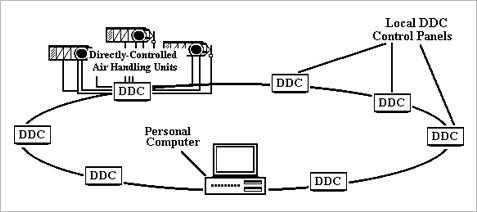 This course is designed to provide an understanding of advanced concepts and operations of Direct Digital Control systems. Individuals who attend this seminar should have a good background of HVAC systems, conventional control principles (pneumatic and/or DDC) and feel comfortable with the use of a personal computer. Attendees to this seminar can expect to gain a good theoretical and practical knowledge of advanced DDC control systems.
This course is designed to provide an understanding of advanced concepts and operations of Direct Digital Control systems. Individuals who attend this seminar should have a good background of HVAC systems, conventional control principles (pneumatic and/or DDC) and feel comfortable with the use of a personal computer. Attendees to this seminar can expect to gain a good theoretical and practical knowledge of advanced DDC control systems.
Monday
Review of HVAC theory and principles. Summary of control system system types (electronic, pneumatic, computer) and their advantages and disadvantages. Review of pneumatic control principles to include DA, RA, spring ranges, NO, NC, sequencing, etc. Windows operating environment. Most of the operations programs today for DDC are being written under the Windows environment. Notebooks with separate monitors will be available at each simulator station for practical experience with the DDC software.
Tuesday
Advanced Input and Output (IO) devices. Temperature, humidity, dewpoint, enthalpy pressure, current, watt, flow and status sensors. Current (I), Voltage (E), Pneumatic (P) and Pulse Width Modulation (PWM) transducers. Calibration of 4-20 ma transmitters and transducers. A transmitter will be calibrated on the training simulators using decade box substitution. Each simulator station has an array of sensors, transducers, EP's, pilot relays, etc. to allow hands-on experience with the various I/O devices.
Wednesday
Programming the DDC. Translating the sequence of operation for an HVAC control system into an operations program for a DDC system. The system used to program the training simulators uses state-of-the-art graphic programming. Using a graphic approach allows complex control algorithms to be compiled into easy to understand and configure graphic blocks. It also allows easy changing and documenting (printing) of the HVAC control program. This mouse driven programming language is certainly the future of DDC and integrates very well into the Windows graphic operating environment. Various HVAC control systems will be configured on the simulators. Systems to be created and programmed include reheat air handling unit, economizer cycle, reset HWS, VAV with static pressure control of fan volume, etc.
Thursday
Continuation of the Wednesday format of programming, editing and debugging of DDC systems. Communications and networking architecture options for DDC. LAN strategies and modern communications techniques. Advantages and tuning of P, PI and PID control sequences to allow a better understanding of the principles involved. The simulators will allow real-time observations of the tuning process of the P, I and D values in the control loop.
Friday
Specifications generation and commissioning of a DDC system. How to convert a sequence of operations for an HVAC systems into a viable DDC specification. How to insure the proper installation and debugging of the system through a comprehensive commissioning procedure. One of the largest areas of failure of new installations of DDC seems to be a failure to properly commission the system. Insuring complete, comprehensive shop drawings and hardware documentation is provided at the completion of the project.
NOTE: Each attendee to the seminar will receive a textbook, manufacturers' data sheets and a completion certificate.